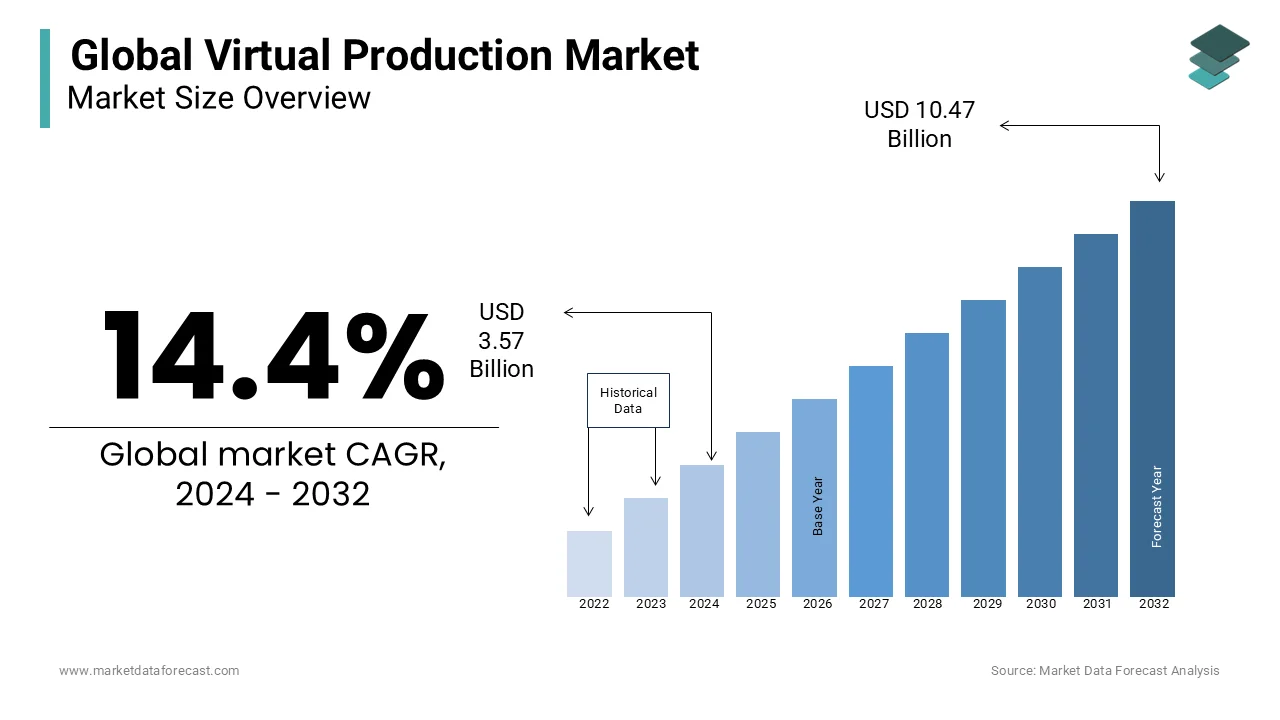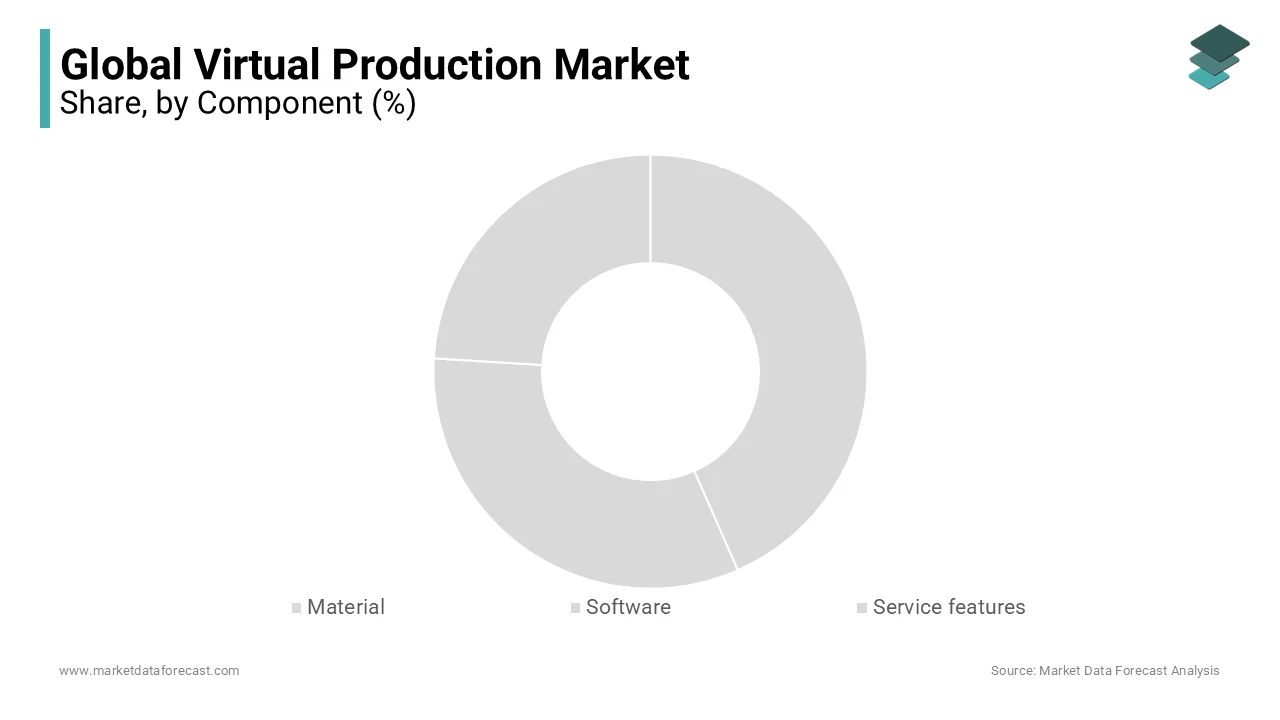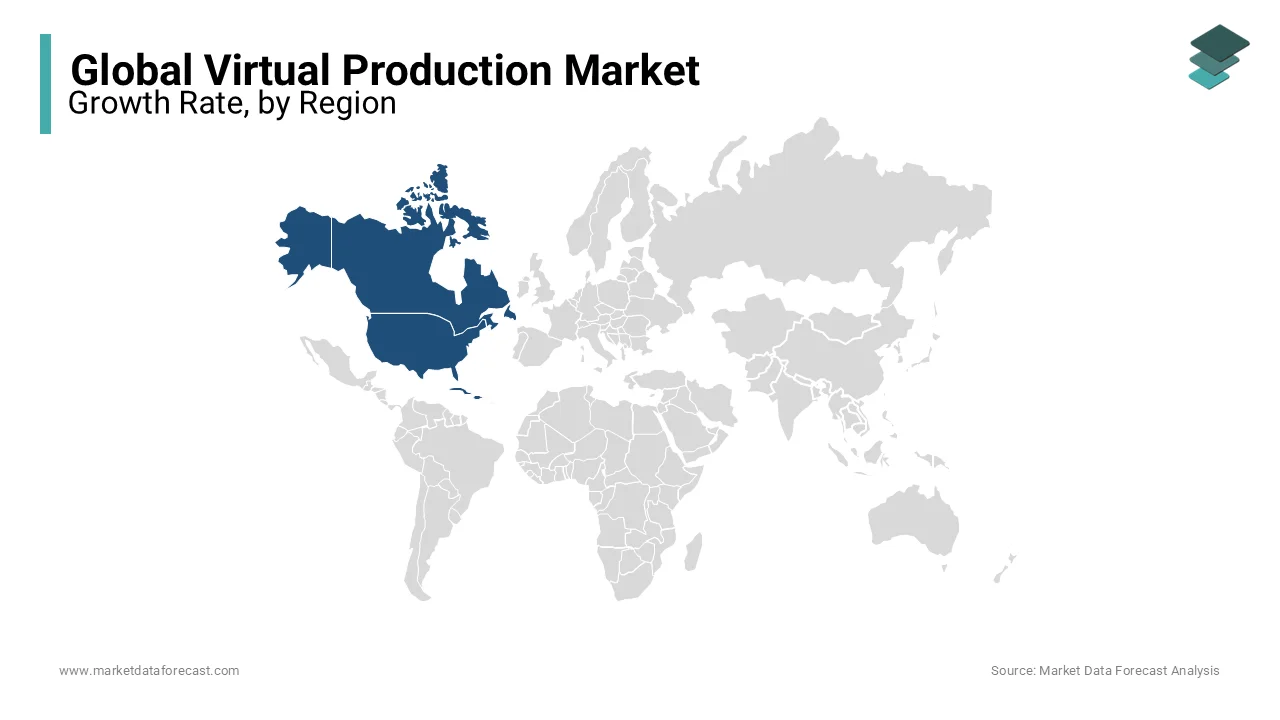Global Virtual Production Market Size, Share, Trends, & Growth Forecast Report – Segmented by Component (Hardware, Software, Services), Type (Pre-Production, Production and Post-Production), End-user (Film, TV Series, Online Videos and Commercial Advertisements), & Region - Industry Forecast From 2024 to 2032
Global Virtual Production Market Size (2024 to 2032)
The global virtual production market was worth USD 3.12 billion in 2023. The global market is expected to reach USD 3.57 billion in 2024 and USD 10.47 billion by 2032, growing at a CAGR of 14.4% during the forecast period.

Virtual production allows filmmakers to interactively view and explore digital scenes such as lifelike virtual characters, 3D graphics, and a real-time interactive virtual background environment in the studio. Great advances in the field of virtual production over the years have led to the introduction of solutions that allow filmmakers to transfer motion captured by an actor's movement to virtual characters, which are then previewed in real time, in combination with the live action. images and extension elements of the virtual scene. These solutions help filmmakers plan and communicate their creative ideas in new and more intuitive ways.
MARKET DRIVERS
The increasing popularity of virtual production in the media and entertainment industry, combined with its capabilities to create high-definition images and virtual environments in real time, is the key driver for the growth of the market.
This technology enables filmmakers to reduce the demand for production crews and crew members on set by integrating virtual background environments with live action footage. This enables a significant reduction in video production costs. In addition, technological advances in virtual production help broadcasters to improve their operational efficiency with less physical presence of technicians in the broadcast room.
Factors such as operating a three-dimensional environment have increased companies' focus on developing compact and comfortable virtual gaming devices, and constant technological innovation in virtual production platforms, such as audio. 3D, unconnected VR headsets, and cloud scalability are expected to drive market growth through gaming applications. In addition, the introduction of an immersive experience enables 360 ° views of graphical content and a new level of game interaction, allowing players to control and modify the game environment through their senses. Therefore, the increased application of virtual production technology in games is likely to drive market growth.
The software segment accounted for the largest market share of nearly 42% in 2019 and is supposed to maintain its dominance during the forecast period.
The hardware segment is expected to grow at a significant rate and is estimated to occupy the second position in terms of market revenue during the conjecture period. This can be attributed to the dramatic increase in the number of LED video wall displays with real-time background image required for indoor shooting.
Another trend in the film industry that improves the quality of production is the use of 4K. Film production units are increasingly using 4K technology to produce high quality content and allow editorial and visual effects departments to improvise without losing information. 4K technology refers to content and screens with a resolution of 4096 x 2160. 4K resolution in film production provides quality images with higher resolution and improvised product quality than previous (HD) versions. TV series, feature films, independent films, natural history, and music programming currently use 4K technology in production. Short commercials of a relatively high budget nature are also filmed with 4K cameras. However, these movies are downgraded from 4K to HD upon delivery to meet the availability of 4K displays in homes and theatres. Additionally, high bandwidth and storage requirements had contributed to minimal penetration of 4K technology in the film and video industry.
REPORT COVERAGE
|
REPORT METRIC |
DETAILS |
|
Market Size Available |
2023 to 2032 |
|
Base Year |
2023 |
|
Forecast Period |
2024 to 2032 |
|
CAGR |
14.4% |
|
Segments Covered |
By Components, Type, End User, and Region |
|
Various Analyses Covered |
Global, Regional & Country Level Analysis, Segment-Level Analysis, DROC, PESTLE Analysis, Porter’s Five Forces Analysis, Competitive Landscape, Analyst Overview on Investment Opportunities |
|
Regions Covered |
North America, Europe, APAC, Latin America, Middle East & Africa |
|
Market Leaders Profiled |
360Rize, Adobe, Arashi Vision Inc. (Insta 360), Autodesk Inc, BORIS FX, INC, Epic Games, Inc., HumanEyes Technologies, Mo-Sys Engineering Ltd., NVIDIA Corporation, Panocam3d.com, Pixar (The Walt Disney Company), Side Effects Software Inc (SideFX), Technicolor and Vicon Motion Systems Ltd and Others. |
SEGMENTAL ANALYSIS
Global Virtual Production Market Analysis By Component

In terms of components, the software segment is supposed to grow at a significant rate due to the integration of artificial intelligence. The inclusion is likely to improve animation performance and graphics quality.
Global Virtual Production Market Analysis By End User
In terms of end users, the motion picture segment is expected to generate a significant amount of revenue to the market during the forecast period. The growth can be attributed to the growing demand for visual effects and a three-dimensional model in movies.
REGIONAL ANALYSIS

Based on the region, North America accounted for the dominant portion in the worldwide virtual production market, followed by Asia Pacific and Europe. The market is likely to expand with the rising budget in movies and TV series around the world.
KEY PLAYERS IN THE GLOBAL VIRTUAL PRODUCTION MARKET
The main players in the global virtual production market include 360Rize, Adobe, Arashi Vision Inc. (Insta 360), Autodesk Inc, BORIS FX, INC, Epic Games, Inc., HumanEyes Technologies, Mo-Sys Engineering Ltd., NVIDIA Corporation, Panocam3d.com, Pixar (The Walt Disney Company), Side Effects Software Inc (SideFX), Technicolor and Vicon Motion Systems Ltd.
RECENT DEVELOPMENTS IN THE GLOBAL VIRTUAL PRODUCTION MARKET
-
In June 2020, Epic Games, Inc. updated its Play Station software, Unreal Engine 4.25, and introduced an advanced version of Unreal Engine 5. Unreal Engine is visual effects software that can be used to view, design, and modify visual effects in a real-time environment.
-
In November 2020, Epic Games Inc. acquired Quixel, a photogrammetry asset library company that makes three-dimensional models based on high-definition photographs.
-
March 2020, Epic Games Inc. acquired Cubic Motion, a provider of highly detailed digital facial animations for movies and video games.
-
In March 2020, Sky Sports rolled out a virtual production suite, which enabled its teams to create content and deliver it remotely.
DETAILED SEGMENTATION OF THE GLOBAL VIRTUAL PRODUCTION MARKET INCLUDED IN THIS REPORT
This research report on the global virtual production market has been segmented and sub-segmented based on the component, type, end user, and region.
By Component
-
Material
-
Software
-
Service features
By Type
-
Preproduction
-
Production
-
Post-production
By End User
-
Film
-
TV Series
-
Commercial Announcements
-
Online Videos
-
Others
By Region
-
North America
-
The United States
-
Canada
-
Rest of North America
-
-
Europe
-
The United Kingdom
-
Spain
-
Germany
-
Italy
-
France
-
Rest of Europe
-
-
The Asia Pacific
-
India
-
Japan
-
China
-
Australia
-
Singapore
-
Malaysia
-
South Korea
-
New Zealand
-
Southeast Asia
-
-
Latin America
-
Brazil
-
Argentina
-
Mexico
-
Rest of LATAM
-
-
The Middle East and Africa
-
Saudi Arabia
-
UAE
-
Lebanon
-
Jordan
-
Cyprus
-
Frequently Asked Questions
How is virtual production revolutionizing the filmmaking process on a global scale?
Virtual production is revolutionizing filmmaking by enabling filmmakers to visualize and manipulate scenes in real time, reducing the need for physical sets, streamlining production workflows, and enhancing creative flexibility. This technology allows for more immersive storytelling and significant cost savings in both pre-production and post-production phases.
What role do augmented reality (AR) and virtual reality (VR) play in the virtual production market globally?
AR and VR technologies complement virtual production by offering immersive experiences for both filmmakers and audiences. AR can be used on set to visualize virtual elements within real-world environments, while VR enables filmmakers to explore virtual sets and environments before production begins. These technologies enhance creativity and collaboration while offering new storytelling possibilities.
Are there any notable trends or emerging technologies shaping the future of the global virtual production market?
Some notable trends and emerging technologies shaping the future of the virtual production market include the integration of artificial intelligence (AI) for enhanced visual effects and automation, the use of volumetric capture for realistic 3D representations of actors and objects, and advancements in real-time motion capture and facial animation technologies.
What are the potential implications of the virtual production market's growth on traditional filmmaking and visual effects industries worldwide?
The growth of the virtual production market has the potential to disrupt traditional filmmaking and visual effects industries by offering more efficient and cost-effective production methods. While traditional techniques will likely continue to have a place in filmmaking, virtual production technologies are expected to become increasingly prevalent, leading to shifts in industry dynamics and workforce skill requirements.
Related Reports
Access the study in MULTIPLE FORMATS
Purchase options starting from $ 2500
Didn’t find what you’re looking for?
TALK TO OUR ANALYST TEAM
Need something within your budget?
NO WORRIES! WE GOT YOU COVERED!
Call us on: +1 888 702 9696 (U.S Toll Free)
Write to us: [email protected]